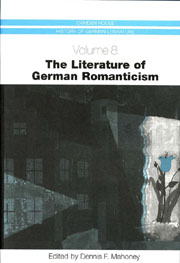Book contents
- Frontmatter
- Contents
- Illustrations
- Acknowledgments
- Abbreviations
- Introduction
- From “Romantick” To “Romantic”: The Genesis of German Romanticism in Late Eighteenth-Century Europe
- Goethe and the Romantic
- Early Romanticism
- From Goethe's Wilhelm Meister to anti-Meister Novels: The Romantic Novel between Tieck's William Lovell and Hoffmann's Kater Murr
- Tales of Wonder and Terror: Short Prose of the German Romantics
- The Romantic Drama: Tieck, Brentano, Arnim, Fouqué, and Eichendorff
- German Romantic Poetry in Theory and Practice: The Schlegel Brothers, Schelling, Tieck, Novalis, Eichendorff, Brentano, and Heine
- The Turn to History and the Volk: Brentano, Arnim, and the Grimm Brothers
- History and Moral Imperatives: The Contradictions of Political Romanticism
- Romanticism and Natural Science
- Gender Studies and Romanticism
- The Romantic Preoccupation with Musical Meaning
- Romanticism and the Visual Arts
- Goethe's Late Verse
- The Reception of German Romanticism in the Twentieth Century
- Works Cited
- Notes on the Contributors
- Index
Romanticism and Natural Science
Published online by Cambridge University Press: 05 February 2013
- Frontmatter
- Contents
- Illustrations
- Acknowledgments
- Abbreviations
- Introduction
- From “Romantick” To “Romantic”: The Genesis of German Romanticism in Late Eighteenth-Century Europe
- Goethe and the Romantic
- Early Romanticism
- From Goethe's Wilhelm Meister to anti-Meister Novels: The Romantic Novel between Tieck's William Lovell and Hoffmann's Kater Murr
- Tales of Wonder and Terror: Short Prose of the German Romantics
- The Romantic Drama: Tieck, Brentano, Arnim, Fouqué, and Eichendorff
- German Romantic Poetry in Theory and Practice: The Schlegel Brothers, Schelling, Tieck, Novalis, Eichendorff, Brentano, and Heine
- The Turn to History and the Volk: Brentano, Arnim, and the Grimm Brothers
- History and Moral Imperatives: The Contradictions of Political Romanticism
- Romanticism and Natural Science
- Gender Studies and Romanticism
- The Romantic Preoccupation with Musical Meaning
- Romanticism and the Visual Arts
- Goethe's Late Verse
- The Reception of German Romanticism in the Twentieth Century
- Works Cited
- Notes on the Contributors
- Index
Summary
“Wem die Natur vergönnte in sich ihre Harmonie zu finden, – der trägt eine ganze, unendliche Welt in seinem Innern – er ist die individuellste Schöpfung – und der geheiligste Priester der Natur.”
Henrik SteffensToward the end of the eighteenth century, more than the French Revolution and the Napoleonic conquests were shaking Europe. German and European Romantics also found themselves caught up in fundamental cognitive changes brought about by new and increasingly specialized sciences, particularly in the fields of natural science, medicine, and technology. New conceptions often revolutionize traditional forms of knowledge and require a presentation that influences the development of the language of science as well as our everyday communication. Such proved to be the case of Romanticism, a literary epoch situated on the threshold of the era of machines.
This charged and tumultuous atmosphere reflected the élan of the Age of Enlightenment, which critically investigated medieval-scholastic worldviews and scientific conceptions, linked with ideas of the Renaissance and Humanism, and made it possible to approach the ideal of the liberated human self. This process continued to influence the generation of Romantics born around 1770 until the start of the nineteenth century. In their educational development, they came into contact with some of the best scholars of the time. Esteemed and reputable historians, philosophers, natural scientists, and physicians disseminated European knowledge at German universities and academies. Heinrich von Kleist called them “die Lehrer der Menschheit” (the educators of humanity).
- Type
- Chapter
- Information
- The Literature of German Romanticism , pp. 209 - 228Publisher: Boydell & BrewerPrint publication year: 2003

